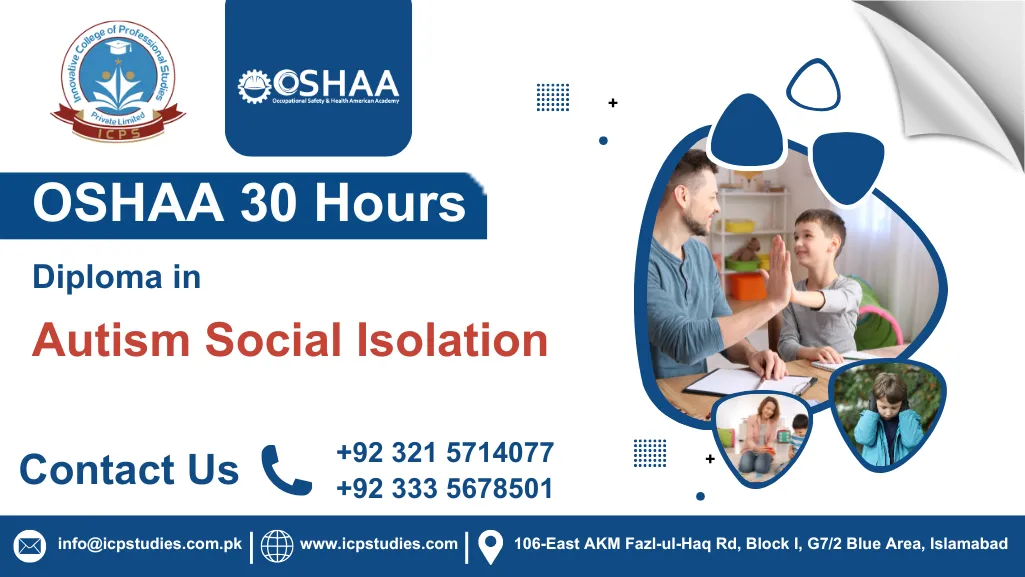Autism Spectrum Disorder (ASD) is a developmental condition that affects how individuals perceive and interact with the world around them. One of the most challenging aspects of autism is social isolation, which can have profound effects on an individual’s mental and emotional well-being. The OSHAA 30-Hours Diploma in Autism Social Isolation provides an in-depth understanding of the causes, impact, and strategies to support individuals with autism who experience social isolation.The OSHAA 30-Hours Diploma in Autism Social Isolation is an intensive, specialized training course designed to provide participants with a thorough understanding of autism and its impact on social interaction.
This 30-hour diploma offers a structured learning pathway that blends theory with practical applications, focusing on the relationship between autism and social isolation. Participants will gain insight into behavioral patterns, social communication difficulties, and environmental factors that contribute to isolation. Through case studies, real-life examples, and intervention techniques, learners will develop the ability to design supportive environments and implement inclusive practices.With a focus on the challenges individuals with ASD face in social settings, this course explores practical strategies to reduce isolation and encourage social participation.
The diploma is ideal for educators, caregivers, healthcare professionals, social workers, and individuals who work closely with people on the autism spectrum. By completing this course, learners will not only deepen their knowledge but also acquire practical skills to reduce isolation and improve the quality of life for individuals with autism, empowering them to thrive socially and emotionally. Whether you’re a professional working in healthcare, education, or community services, or a caregiver looking to improve the well-being of a loved one, this course will help you foster meaningful social connections and improve the lives of individuals with autism.
All About OSHAA 30-Hours Diploma in Autism Social Isolation
Course Overview
The OSHAA 30-Hours Diploma in Autism Social Isolation is a focused training program aimed at understanding the unique challenges faced by individuals with Autism Spectrum Disorder (ASD) who experience social isolation. This course highlights the impact of isolation on emotional well-being, communication, and social development, while providing strategies to build supportive and inclusive environments.
Learners will explore the causes and consequences of social isolation in autism, develop awareness of behavioral and social communication patterns, and gain practical tools to encourage engagement and inclusion. With a blend of theoretical knowledge and real-world case studies, the program equips participants to address social isolation with empathy and effectiveness.
Designed for educators, caregivers, social workers, healthcare professionals, and anyone working with individuals on the autism spectrum, this diploma enhances both understanding and practical skills. By completing the course, learners will be prepared to promote inclusion, reduce isolation, and positively influence the lives of people with autism in community, educational, and family settings.
Study Units
- Introduction to Autism Spectrum Disorder (ASD) (3 hours)
- Understanding Social Isolation in Autism (4 hours)
- Communication and Social Skills Development (4 hours)
- Barriers to Social Inclusion for Individuals with Autism (4 hours)
- Building Social Connections and Relationships (4 hours)
- Creating Inclusive Environments for Social Participation (4 hours)
- Interventions and Support Strategies for Social Isolation (4 hours)
- Collaborating with Families and Caregivers (3 hours)
To enroll in the OSHAA 30-Hours Diploma in Autism Social Isolation, applicants should meet the following requirements:
- Minimum Age: Candidates must be at least 18 years old.
- Educational Background: A high school diploma or equivalent qualification is recommended. Applicants with backgrounds in education, healthcare, psychology, or social work will find the course especially beneficial.
- Work Experience: No prior professional experience is required, though experience in teaching, caregiving, or working with individuals with special needs is an added advantage.
- Language Proficiency: Learners should have a good understanding of English, as the course materials, discussions, and assessments are delivered in English.
The OSHAA 30-Hours Diploma in Autism Social Isolation is designed for individuals who wish to deepen their knowledge and practical skills in supporting people with Autism Spectrum Disorder (ASD) who experience social isolation. This course is suitable for:
- Educators and Teachers who want to create inclusive classroom environments that reduce isolation for students with autism.
- Healthcare Professionals and Therapists seeking to enhance their understanding of social and emotional challenges in autism.
- Social Workers and Community Support Staff aiming to provide better care, guidance, and interventions for individuals with ASD.
- Parents and Caregivers who wish to learn effective strategies to support their children or family members with autism in overcoming isolation.
- Students and Fresh Graduates in psychology, education, social sciences, or healthcare fields who want to build a foundation in autism-related support.
Learning Outcomes
Understanding Autism and Social Isolation
- Explain the link between autism spectrum disorder (ASD) and social isolation.
- Identify emotional, behavioral, and developmental challenges related to isolation.
- Recognize the long-term effects of isolation on mental health and well-being.
Communication and Behavioral Awareness
- Understand barriers to effective communication in individuals with autism.
- Analyze common behavioral responses associated with social isolation.
- Apply strategies to improve social interaction and engagement.
Inclusive Practices and Support Strategies
- Develop approaches to create inclusive learning and community environments.
- Implement supportive interventions that reduce isolation and encourage participation.
- Foster positive peer and family relationships to enhance social connection.
Health, Safety, and Emotional Well-being
- Address risks linked to prolonged isolation in individuals with autism.
- Promote safe, empathetic, and supportive environments.
- Encourage emotional resilience and coping mechanisms for individuals with ASD.
Professional and Community Engagement
- Demonstrate professional competence in reducing autism-related social isolation.
- Collaborate effectively with families, educators, and community organizations.
- Provide guidance and practical solutions to support inclusion.
FAQs OSHAA 30-Hours Diploma in Autism Social Isolation

